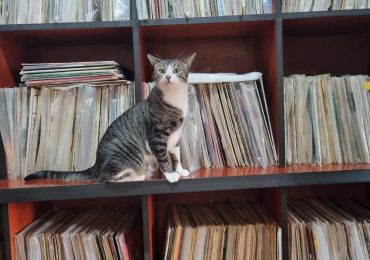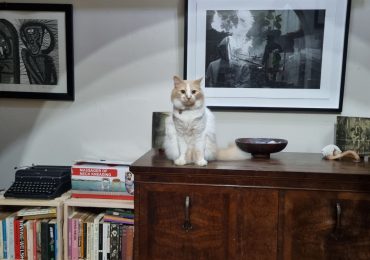For the Record:
It’s the end of the year and so time to file another stinker away and hope that things can only get better. For this 20th edition of the JRB playlist let me tell you a story that may or not mean something, everything, anything.
I recently ordered a record from a store in the United States. The store, not having had much experience with the vagaries of the South African Post Office in its dying days, did not offer a door-to-door courier option for delivery. What it promised instead was quick, efficient, safe delivery via registered courier to the post office. Sceptical but determined that I would have this record by whatever means necessary, I dutifully paid for my purchase and its delivery method, held thumbs and waited.
Thanks to an app that monitors the deliveries made by this store, I was minutely informed of every movement of my measly package from stockroom to delivery van, airport cargo warehouse, plane, train, automobile.
Two weeks passed and the app kept my hopes up—the package had arrived in South Africa, cleared customs and was in transit to a sorting centre. Three weeks after purchase and thanks to modern technology I had beady digital eyes on the location of my package—a post office sorting office somewhere to the west of the Johannesburg city centre but not quite west enough to allay my fears that it wasn’t sitting at my local branch, ‘Ready for pickup.’ And so, ‘ready for pickup’ somewhere in the city, so close yet so confoundingly out of reach, my purchase sat, and sat, and sat.
After eight weeks with no further update from the app and many sadly hopeful sorties to my mailbox in search of a collection slip, I decided it was time for some sort of follow-up that might involve people who knew something about anything.
First, to the US courier service responsible for so promptly transferring the package from its stateside home, across the sea, down the length of the continent, and into the city of gold. The faceless person who emailed me was very sorry, but pointed out that the courier service had done their job and that any other failure was the fault of my local postal service and the package was probably lost after such a long period. The store that sold me the record was less polite and infuriatingly unhelpful: ‘Our policy is that queries can only be answered if submitted within sixty days of purchase.’ Our American friends, it seemed, would not be the friendly, eager-to-please rescuers I had hoped for.
And so it fell to the luckless, exhausted, package-less record collector to swallow hard, bite the bullet and do the unthinkable—phone the South African Post Office call centre number and pray that it, unlike so many actual post office branches, was staffed by a person. Three rings, four, five, hold music, thoughts of failure, self-flagellation at the belief in the idea that post still gets sent, hang up, forget about the record, move on with your life—Hello? The call centre was not a ghostly moon base, there was someone on the other end of the line, someone gently kind, helpful, patient, sitting next to a working computer and able to tell me that my package had indeed arrived at a post office branch on the date indicated by the app and that it was still there, it hadn’t been sent back, and that if I went there directly with my tracking number—no collection slip necessary—I could probably still claim it.
The post office branch I was told my record had been living for three months is far enough from where I stay that if I had received a collection slip to pick it up there I would have been angry, but not far enough to stop me immediately rallying the troops and heading off to finally get my grubby hands on my long-awaited prize. ‘Don’t worry,’ I told my long-suffering partner, ‘it won’t take long, but I must rescue my record.’ And so off we went to Fordsburg.
Walking into the post office was like walking into 1983. Besides a few computers at some mostly empty counters, there was little sign that anything had changed architecturally or technologically in four decades.
It was hot, very hot, but inside things looked hopeful—only one line of bedraggled looking men holding photocopied documents and waiting to renew their drivers’ licences. After fifteen minutes, during which time no other counter was opened for any reason, and the clerk responsible for drivers’ licences seemed to have disappeared forever—because all the machines or devices that are needed for this process are not in the front but somewhere in the back—I began to worry that this might not be as easy as it should be.
Fifteen more minutes, with only one person in the small queue dealt with, the temperature rising, my partner’s eyes narrowing in accusation, I wasn’t so sure that rescuing the record would be as pain free as I had promised.
Eventually, a voice from one of the other counters informed us that anyone not needing to renew their driver’s licence could make their way to the counter on the right. Three of the people who had been standing in the wrong queue now shifted sheepishly to the side.
After watching the trials and tribulations of an exasperated gentleman trying to get his pension payout for fifteen more minutes, it was finally my turn at the counter. A pleasant enough woman listened to my story, looked at my phone to see the tracking number and then disappeared somewhere in the back for five, ten, fifteen minutes, before returning with three battered looking ledgers and informing me that these were the logbooks of parcels sent to this post office and the one that should have sent me a collection slip and that she would need our help in order to go through them and locate the written record of my parcel. We had come to collect a package and now we were somehow working for the post office.
After what seemed like an eternity, during which time we managed to locate other deliveries made to our house for my partner and see the names of other people who I recognised but hadn’t seen in ages or known to live in my neighbourhood, I had a moment equivalent to one in an Indiana Jones film where the pages seemed to mysteriously glow and I saw my own name written in the post office’s holy book, next to a number that matched the one I had on my app. It was in a ledger that the post office clerk had already finished with, and she explained that she had been looking for the name ‘Smith Tymon’ and not ‘Tymon Smith’.
I wiped the sweat off my Kafka-infected brow and told her not to worry as she disappeared again for another fifteen minutes, bringing the total time we had now been in the post office to over an hour. As we looked at each other, trying to figure out what happened in the back, where the clerks seemed to disappear without sound or evidence of existence, a loud laugh of absurd resignation erupted behind us.
Turning, we saw a man in the queue behind us, who, having watched our Sisyphean trial, was now laughing and shaking his head. ‘I don’t know where they go but this is madness,’ he said, the last vestiges of patient sanity slipping from his sweltering visage. I shrugged my shoulders. At this moment the clerk returned, carrying my slightly battered but long-awaited package in her hand. We eagerly collected it and, as we turned to leave, my partner asked the man behind us, ‘What are you trying to do?’ He grinned, held out an envelope and said, ‘I’m trying to post a letter.’ ‘At the post office?’, we laughed and wished him luck before finally escaping the asylum.
That record is included in this year-end playlist because it managed to actually get here. As you enjoy your holidays, swapping the despairing tales of general malaise that have become what passes for conversation in Johannesburg, spare a thought for the man who went to the post office, trying to post a letter. He may well still be there.
- Tymon Smith is a member of The JRB Editorial Advisory Panel, and a freelance journalist who writes about the arts and South African history. Previously the literary editor of the Sunday Times, he is the recipient of a silver Standard Banks Arts Journalist of the Year Award for feature writing. He was the head researcher for the interactive DVD Between Life and Death: Stories from John Vorster Square, and is working on a book about the Johannesburg police station.





